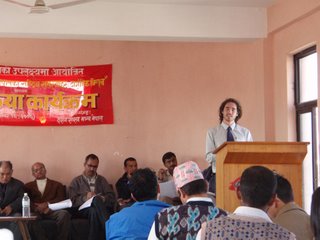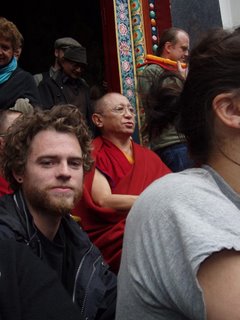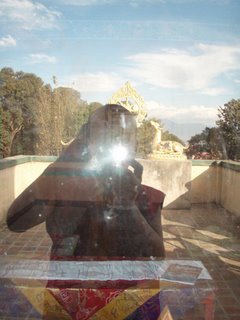recently a good friend asked me in email whether or not altruism is an appropriate desire.
i think this represents a misunderstanding of Buddhism, coming out of the simplistic way the Dharma is often presented. This is not confined to westerners, but i do think that an emphasis on a very old Pali textual tradition of Buddhism that likes to present itself as the original teachings of the Buddha, without historical change or "corruption," that has been overemphasized by those that write on "pure Buddhist philosophy" without the degradation of guru worship/Buddha image worship/belief in spirits/etc.
Therefore, we often hear the classical maxim, a restatement of the 4 Noble Truths uttered by the Buddha in Sarnath that "since suffering comes from desire, by eliminating desire we eliminate suffering, which leads to nirvana." this summer a Chicago man I met in Dharamsala at my hotel replied that he wasn't going to attend the teachings by His Holiness the Dalai Lama that were going on a short walk away because he found that if you had heard one teaching on Buddhism you had heard them all, since Buddhism is really just telling us to give up all pleasures.
What, really?
No.
"the roads of excess lead to the palaces of wisdom" -william blake
from an orthodox vajrayana buddhist point of view (a historical and philosophical development, emphasizing the effectiveness of ritual, that is most commonly represented by Tibetan Buddhism), it is absolutely
essential to have many different kinds of desire to quickly reach
enlightenment. these include the desire [the tibetan word 'dod pa
means wish/want/desire, the word for the negative kind of desire is
'dod chags, which connotates a clinging or attachment to that which is
desired] that all beings may have happiness and its causes, the desire
that all beings may be divorced from suffering and its causes, the
desire for enlightenment, the desire to make your own mind like that
of the enlightened guru's, etc.
"How can we repay the kindness of the sentient beings? Through showing them immaculate love and compassion. Immaculate love is the thought, 'May they have happiness and its causes.' Compassion is the wish, 'May they be free of suffering and its causes.' Because to obtain happiness and to avoid suffering are the two most primordial, inborn instincts of all that live, to give love and compassion is the supreme gift." - His Holiness the Dalai Lama, from "The Path to Enlightenment."
in this way, desire is part of the raft that carries us over to the
other shore beyond the oceanlike suffering of our neurotic mind, and
that raft should be abandoned once we land the raft.
however, we're still on the raft.
there is a misperception that all desire is bad. some desire can be a
shortcut to understanding. especially if you can look into your mind
on the occasions when you are really attached to something or having
lots of desirous feelings. examine where they come from and where
they go, whether they remain and what they are based on. you may see
that they are really just a composition of thoughts and feelings, many
of which are irrational or baseless and that there is nothing substantial to really
point at.
Calm Abiding meditation helps with this. I am saddened to see people that engage in meditation beating themselves up over their negative emotions, lack of clarity, and inability to concentrate, all of which become more apparent when sitting back and examining the mind. These things naturally come up, over and over again. However, they will gradually subside, and we may not even notice that we are less attached to getting our own preferences, and less inclined to react angrily. We may even have the occasional genuine thought like "Well, he's a nice guy, and although I like this girl that we've both been dancing with, if she decides to go out with him, that's alright," or something similar.
it is said that wisdom and the altruistic desire for all beings
to be enlightened (bodhicitta) are like the opposite sides of the same
coin, or two wings of a bird. wisdom, being the realization that
there is no intrinsically real self, is expressed spontaneously through altruistic
activity. although suffering may ultimately be an illusion, since we
interact with it as if it were real, it is real to our minds, and
therefore important to adress. and those who act with a great amount
of altruism will naturally begin to understand what selflessness is
all about. in our culture, we call this "wise."
in a nutshell, some desires are good, and all desires can be skillfully used with the correct training to understand the wisdom of selflessness. so don't feel bad if you find yourself desiring in a destructive way, you are a person afterall, and you aren't a monk, so relax and take some breaths, and see what happens.



 Chris with the venerable Chokyi Nyima Rinpoche, posing for a group photo after the 2006 Seminar on Vajrayana Buddhist Meditation at the White Monastery.
Chris with the venerable Chokyi Nyima Rinpoche, posing for a group photo after the 2006 Seminar on Vajrayana Buddhist Meditation at the White Monastery.







